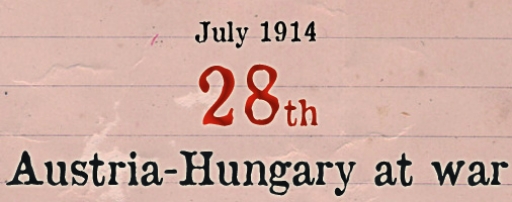The Austro-Hungarian Empire declared war on Serbia on 28th July 1914.
One month earlier, the heir to the throne of Austria-Hungary, Archduke Franz Ferdinand of the House of Habsburg, had been assassinated in Sarajevo.
In mainstream histories of the First World War, the Archduke’s assassination was central to the outbreak of the conflict.
The Balkans context
Tensions had been building in the region for the last decade.
Austria-Hungary’s annexation of Bosnia and Herzegovina in 1908 had angered neighbouring Serbia, which saw the annexation as an encroachment on the Slavic people.
Russia became an increasingly vociferous supporter of Serbia as it sought to expand its influence in the region. This threatened to upset the balance of power in the area.
Tensions had been further exacerbated by a series of wars (The Balkan Wars) fought between the Slavic states of the Balkans and the Ottoman Empire.
The European context
Fears about the rise of the German Empire as a major world power had caused anxiety amongst nations such as Britain, France and Russia.
Britain for instance saw Germany’s increasing maritime power as a threat to its overseas empire, while France was anxious that the industrialision of its German neighbour could see the repeat of a conflict similar to the Franco-Prussian War (1870-71).
To combat these growing anxieties, which were spurred on by incidents such as the Moroccan Crisis of 1911, a series of alliances were formed, in an attempt to maintain the balance of power in Europe.
Over time, these developed into the ‘Triple Entente’ comprising of the United Kingdom, Russia and France and the Triple Alliance of Germany, Austria-Hungary and Italy.
The European context outlined, and other factors, has led some historians to argue that Europe was poised for war to settle questions such as dominance in Europe and imperial ambitions.
As such, some historians have argued that Archduke Franz Ferdinand’s assassition was a catalyst, not necessarily a cause, for the outbreak of hostilities.
When Austria-Hungary invaded Serbia on 28th July 1914 it triggered a tangled web of alliances which began with Russia’s support of Serbia.
Ultimately, the alliance system pitted European nations and their imperial possessions against one another.
Posted by: Daniel Barry, Centenary News
